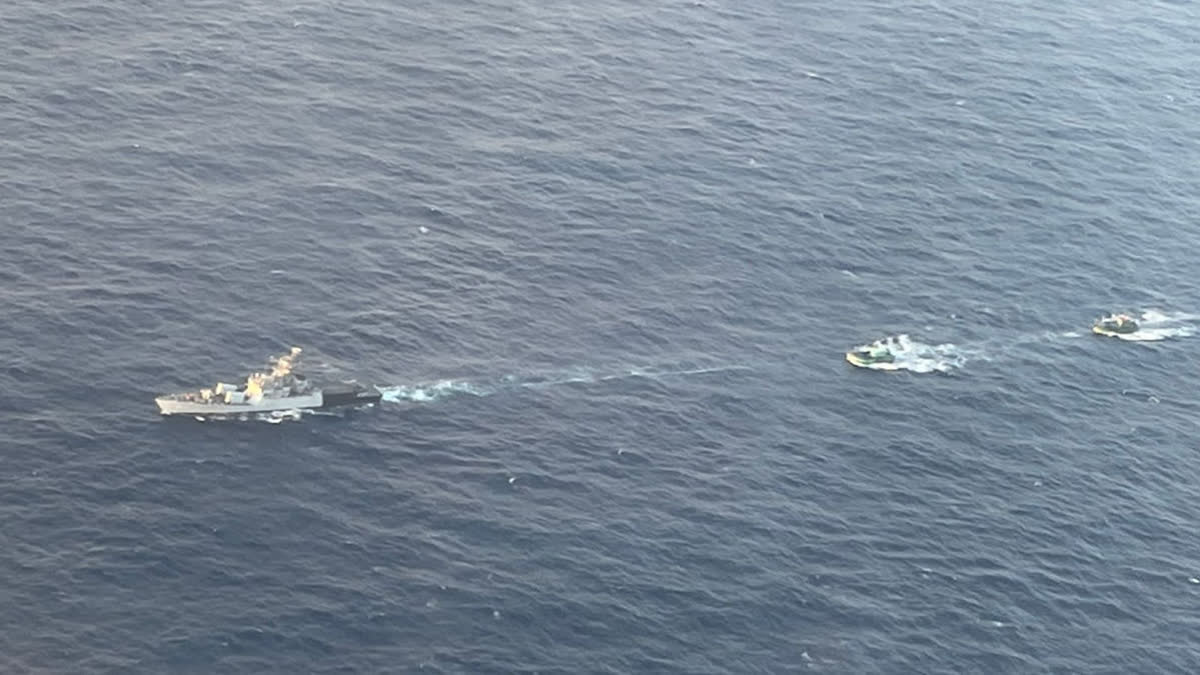Mumbai: In an emphatic address during the ongoing Global Maritime India Summit (GMIS) in Mumbai, Indian government authorities, policymakers, and maritime experts underscored the persistent threat of piracy in the Indian Ocean and its critical implications for both national and global trade. The conference brought together key figures in India's maritime community to address the multifaceted challenges of ensuring maritime security in the Indian Ocean region.
Vice Admiral Dinesh K Tripathi, the Flag Officer and Commanding in Chief of the Western Naval Command, set the tone for the summit by revealing alarming statistics: over 1500 armed robberies occurred in the Indian Ocean in the past year, with piracy standing out as a major area of concern. He emphasized the need for capacity building to act as a deterrent and, if necessary, to employ force to combat piracy.
““More than 1500 armed robberies took place on the Indian Ocean in the last one year. Piracy is a major area of concern and for this, we have to ensure capacity building for deterrents, if necessary, by using force,” Tripathi said.
Tripathi stressed the importance of information as the foundation of maritime security, highlighting the necessity of maritime domain awareness and intelligence. India has fostered partnerships with over 20 national and multinational operators to bolster its information-sharing capabilities and intelligence networks.
Furthermore, in an exemplary demonstration of India's commitment to ensuring the safety and security of its citizens, Tripathi announced that the Indian Navy is prepared to evacuate all Indian nationals stranded in the war-affected nation of Israel. This operation, aptly named 'Operation Ajay,' signifies India's dedication to the safety of its citizens in the face of global challenges.
Also read:India, Vietnam vow to strengthen maritime connectivity and security
Minister of State for Home, Nityanand Rai, emphasized that India's responsibilities in the Indian Ocean are expanding in tandem with its growing global stature. He outlined India's "Security and Growth for All in the Region" (SAGAR) campaign, which has been in operation since 2015. The SAGAR initiative primarily focuses on monitoring the security of the Indian Ocean, the nations within the region, and the maritime trade routes. Rai elaborated on the crucial roles played by the Indian Navy, Coast Guard, and police forces in securing the country's vast coastal areas.
Under the SAGAR campaign, India is actively and vigilantly monitoring the security of the Indian Ocean and collaborating with friendly nations to foster a secure environment that promotes trade and prosperity. International cooperation, Rai noted, is essential for the safety of sea routes, and this can be achieved through law-driven campaigns. He also highlighted the potential of private capital and individuals investing in port and maritime businesses, aligning with the government's aim to establish India as a Blue Ocean Economy.
Vice Admiral (retd) G Ashok Kumar, the National Maritime Security Coordinator, stressed that approximately 95 percent of India's trade relies on maritime transport, underlining the critical need to understand and analyse security threats. He revealed that the government is actively implementing multiple initiatives to enhance maritime security, including the Multi-Agency Maritime Security Group (MAMSG). This group convenes regularly, involving coastal states and other stakeholders, to discuss and address maritime security concerns. The formation of MAMSG represents a pivotal step in bringing together diverse stakeholders, both at the centre and in coastal states and union territories, to collectively address maritime security challenges.
The GMIS conference provided a platform for India to reiterate its unwavering commitment to safeguarding the Indian Ocean and securing vital maritime trade routes. The discussions emphasized the need for international collaboration, the development of maritime intelligence, and the promotion of a secure, prosperous, and digitally connected maritime environment, aligning with India's vision of a Blue Ocean Economy. As the country continues to grow its global influence, its responsibilities in the Indian Ocean will only expand, making maritime security a top priority on its agenda.
